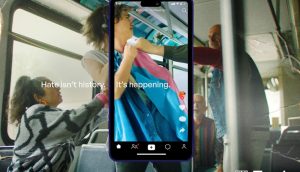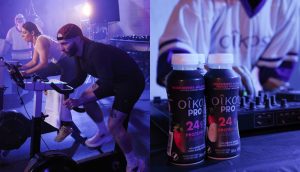Considering the stereotypical gaming demo of teenagers and young adult males, brands like Mountain Dew and Axe Twist have always been a natural fit for in-game advertising.
Looking around at Microsoft’s X’10 Canada holiday preview event held yesterday in Toronto, which gave demos of new games for enthusiasts – many of whom were media professionals dressed in pressed pants and collared shirts – it’s clear that gaming appeals to Canadians outside of this typecast.
Brands like TD Canada Trust, which just wrapped a six-week buy with Xbox Live arranged by Starcom, are now making in-game advertising a part of their media plan, explains Jeffrey Dickstein, gaming solutions executive, Microsoft Advertising.
‘Gaming used to be a mystery,’ Dickstein tells MiC. Advertiser logos used to be hard-coded, which meant long-term planning on the part of brands that often had to consider things like whether their logos would remain the same two years after the game went to market.
Although hard-coding still exists, ‘dynamic’ options on Xbox Live appeal to brands like TD Canada Trust as they can change their messaging to suit different game themes. For example, he says, the basketball court billboard TD created was different from the hockey one, which read ‘Nothing to shake a stick at.’
Advertising in the videogame environment in Canada was $3 million according to 2009 figures released last week for the first time by the Interactive Advertising Bureau (IAB).
The automotive category was the biggest contributor to revenues, making up 12% according to the IAB. Some of them include luxury brands like Porsche, which ran a campaign last year with Xbox.
Dickstein admits many gamers (there are about 2 million Xbox sets in Canada and 1.4 Xbox Live subscribers) wouldn’t be able to afford a luxury car (just 37% of Live players have a greater household income of $100,000 or more) but the brand wanted to promote ‘aspirational’ branding with the buy.
The campaign also included a contest where gamers could enter online to win a driving lesson from a racing professional, which does appeal more to the 18-to-34 demo.
Brands can build their own skins, launch SMS campaign, embed QR codes or host vide contests. AXE Twist, currently in market in a campaign arranged by Mindshare, offers several commercials that gamers can vote on to choose their favourite.
But how do gamers feel about all this branding in the space they so deeply engage in?
‘Eighty percent are either indifferent or supportive,’ says Dickstein. They understand that publishers can build much better games with extra profits, he explains.























